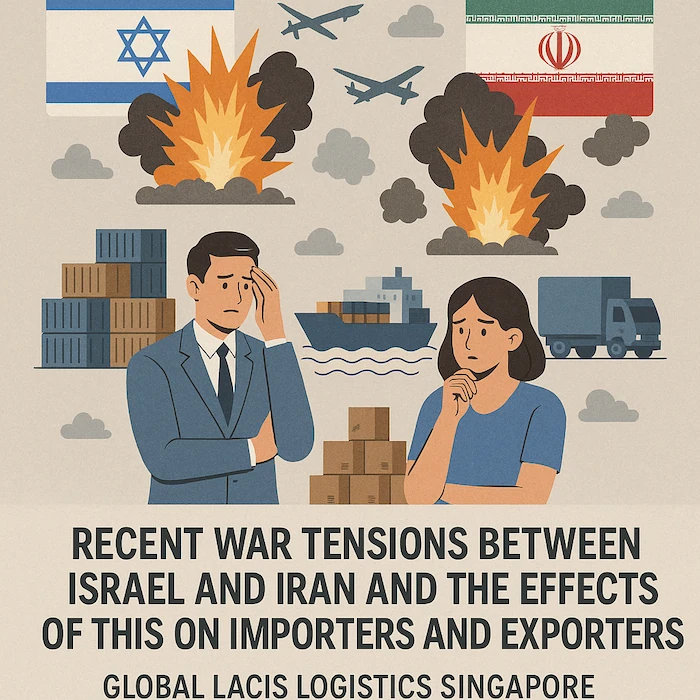If you’re in the business of importing or exporting goods in Singapore, you’ve probably heard about the rising tensions between Israel and Iran. You might be wondering, how does a war so far away impact my shipments or supply chain here in Southeast Asia?
The fact is that even far-off wars have the power to tremble international trade like pond ripples.
At Global Lacis Logistics, we help you understand the “why” behind delays or rising costs—so you can prepare and protect your business.
Let’s break down how global conflicts impact Singapore trade logistics and what you can do today to manage risks.

Why Does the Israel-Iran War Affect Trade in Singapore?
Approximately 20% of the world’s oil consumption, or 20 million barrels of oil per day on average, went through the Strait of Hormuz in 2024 and early 2025. That’s about one barrel for every five used worldwide! In fact, more than a quarter of all maritime oil trade relies on this route. Besides oil, about 20% of the world’s liquefied natural gas also travels through this strait, mostly from Qatar.
When tensions rise in the Middle East, as they did recently with Israel and Iran’s conflict, the world holds its breath. Even if no ships are blocked, just the threat of disruption is enough to send shockwaves across global markets. For example, after recent escalations, the price of Brent crude oil jumped from $69 to $74 per barrel in just one day (June 12 to June 13, 2025). That’s a 7% increase overnight!
Here’s how all this affects Singapore:
- Insurance premiums for ships rise sharply due to the higher risk of conflict in the area.
- Delivery times are extended by up to two weeks for goods routes that are rerouted, frequently around the southern tip of Africa.
- Fuel prices surge globally, raising costs for everything from manufacturing to food delivery in Singapore.
- Ships that once sailed smoothly through Hormuz may now avoid it, leading to longer transit times and higher costs for oil and other goods that pass through the Middle East or depend on global fuel prices.
What Should Singapore Importers Watch For?
If you’re importing goods from Europe, the Middle East, or Africa, you might notice:
Longer lead times: Rerouted ships can add 7–14 days to delivery schedules.
Vessels skipping high-risk ports: Some ships may avoid Middle Eastern ports altogether, causing delays or missed shipments.
Higher prices: Fuel surcharges, port delays, and extra warehousing costs can push up prices by 20–30% in some cases.
Even small delays can quickly snowball, especially if you rely on just-in-time inventory. Staying alert to these changes helps you adjust your budgets, update customers, and reassess your shipping strategies before problems escalate.
What About Exporters?
For Singapore’s exporters—especially in electronics, food, and pharmaceuticals—the ripple effects are just as real:
- Changing buyer behaviors: Overseas customers may delay orders, request reroutes, or reduce demand if shipping becomes unreliable.
- Time-sensitive cargo risks: Perishable goods and urgent shipments are especially vulnerable to delays, risking spoilage or missed deadlines.
- Congestion at safer ports: As more ships avoid Hormuz, alternative ports (including Singapore) can become crowded, causing further slowdowns.
Planning ahead for these disruptions—like securing extra warehouse space or booking shipping slots early—can make a big difference.
What Can You Do Right Now?
Here’s how you can reduce the impact on your supply chain:
- Talk to your freight forwarder: Ask about alternate routes, even if they take longer—they’re often safer and more reliable during conflicts.
- Split large shipments: Sending smaller batches on different ships spreads your risk if one route is delayed.
- Place orders earlier: Build in a 10–15 day buffer to account for possible slowdowns.
- Review your cargo insurance: Make sure your policy covers war-related disruptions, as standard insurance often doesn’t.
A little proactive planning today can mean fewer surprises tomorrow.
How Global Lacis Logistics Can Help
At Global Lacis Logistics Singapore, we monitor geopolitical risks daily. Through our global carrier network and real-time intelligence, we help you:
- Navigate alternate freight routes
- Understand the latest pricing and availability updates
- Choose the safest, most cost-effective shipping solutions
More importantly, we translate complexity into clear, helpful guidance—so you can make smart, confident logistics decisions.
Final Thoughts
The Israel-Iran conflict may seem distant, but its effects are felt right here in Singapore. With one-fifth of the world’s oil and gas moving through a single chokepoint, even a small disruption can send prices soaring and delay shipments worldwide. But with the right planning, a trusted logistics partner, and a clear understanding of global risks, you can keep your supply chain moving, no matter what happens next.
Have questions? Contact Global Lacis Logistics. We’re here to help you move forward, even when the world gets complicated.